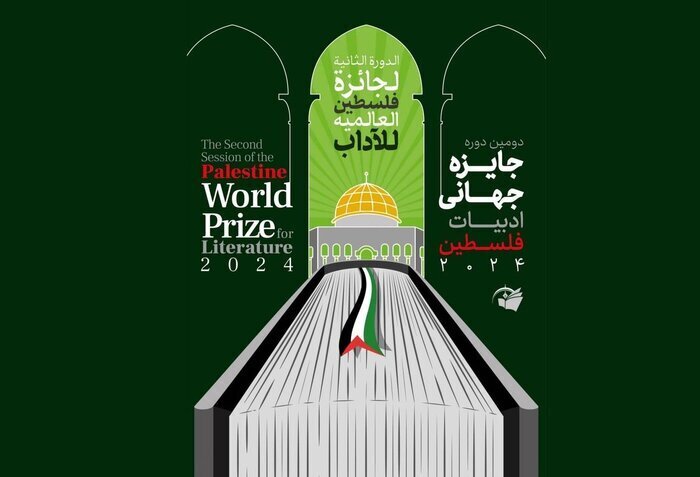Palestine World Prize for Literature announces winners
Palestine World Prize for Literature announces winners
TEHRAN- The second edition of the Palestine World Prize for Literature announced its winners across six categories during a ceremony held in Baghdad, Iraq, on Monday night.

In the play category, first place was awarded to “I Mean to Bury Them” by Du'a Muhammad Ismail Ibrahim Al-Bayati from Iraq, while second place went to “On the Thresholds of Al-Quds” by Nawal Maheni from Egypt.
For the memoirs category, “Five Thousand Days in Barzakh” by Hassan Salameh from Palestine took first place, while “Struggle, Struggle” by imprisoned Captain Kifah Hatab from Palestine came in second, and “Fish Return to the Sea” by Marzieh Etemadi from Iran was awarded third place.
In the short story category, first place went to “Diaries of Struggle and Honor” by Abdul-Majid Zarqat from Lebanon, second place was awarded to “Ashes of the Sparrows” by Hamed Askari from Iran, and third place was jointly awarded to “Futique” by Suham Abu Awad from Palestine and “The Assassination of Reihana” by Mohammad Adnan Suleiman Mardawi from Palestine.
For the novel category, first place was awarded to “Tale of the Wall” by Nasser Abu Sarour from Palestine. Second place was shared between “The Tale of Horror: A Story of War in Gaza” by Ayman Al-Atoum and “Azawad” by Ahmed Bousalim, both from Jordan, while third place went to “Necklace of Jasmine” by Amer Anwar Sultan from Palestine.
The poetry category saw first place awarded to Abdullah Issa from Palestine for his poem “The Sky of Gaza, Hills of Jenin”. Second place went to Ali Al-Amri from Palestine for “This is Palestinian”, and third place was jointly awarded to Victor De Currea-Lugo from Colombia for “Little Poems for Palestine” and Hikmat Gumilar from Indonesia for “From the Wreckage of Flowers to the Story of Memories”.
In the children's literature category, Amal Nasser from Lebanon received first place for “Archivia”, while second place was jointly awarded to Tala El-Fahmawi from the United States for "Salim's Soccer Ball: A Story of Palestinian Resilience" and Seyed Mehdi Mousavi from Iran for “The Secret of the Red Stone”. Third place was shared between Entisar Ba'ala from Syria for “Jaffa and Canaan” and Amira Al-Balushi from Iraq for “The Tale of the Olive”.
The 2nd edition of the Palestine World Prize for Literature received submissions from 26 countries.
A total of 345 book titles were submitted to the prize’s secretariat in Tehran.
Earlier this week, the secretary of the event Mohsen Parviz announced that judges for the second edition of the award were selected from Syria, Lebanon, Algeria, Palestine, Iraq, Yemen, Indonesia, India, and Iran.
He elaborated, "The process has been consistent across all subcategories; judges provided their reasoning for selecting works based on technique and content. The final decision was made collectively by the judges, the head of the jury, and the scientific secretary. Except for two categories with fewer submissions, five works were chosen for final evaluation and ranking."
Parviz emphasized that the primary languages of submitted works were Arabic and Persian, thus leveraging distinguished Arabic-speaking scholars from various Arab countries for this task.
“While the majority of submissions were in Arabic and Persian, there were also entries in English, Urdu, Malay, French, and Spanish.”
Six judging groups were formed in six different categories: plays, memoirs, short stories, children's literature, poetry, and novels. The highest volume of submissions came from the novel category, which received 106 entries, while the play category had the fewest, with only nine submissions, he noted.
He further mentioned that final judges included professors from Iranian universities and language faculties. Additionally, the heads of Arab Writers Union in Syria and Algeria, Muhammad Al-Hourani and Youssef Shakra, assisted in the final judging process.
He expressed hope that through effective media promotion, the selected works could be translated into other languages and serve as advocates for the accurately and artistically rendered narratives defending the Palestinian people.
"Despite a smaller volume of submissions being reviewed over a longer period last time, the quality of works in this edition seems significantly higher,” he remarked.
“The impact of Palestinian heroism on writers and poets will undoubtedly yield even higher quality works in the coming years," he mentioned.
The Palestine World Prize for Literature was established in 2018 in Iran by a collective decision of cultural organizations, writers' unions, and publications from various countries. This biennial award aims to recognize the best works published about Palestine. The first edition of this prize was held in 2022 in Beirut.
SAB/
source: tehrantimes.com